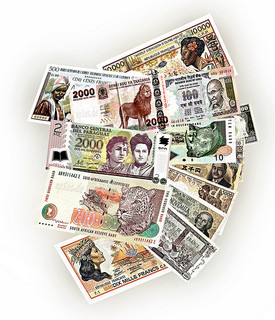Introduction to Exchange Traded Funds (ETFs)
Exchange traded funds are investment funds that are similar to mutual funds in that they can hold a range of assets and commodities. Although most exchange traded funds hold portfolios representative of either bond or stock market indexes, there are also exchange traded funds that invest based on more exotic themes, such as Gold . However, the main difference between exchange traded funds and other investment funds is that exchange traded funds are traded like stock shares on the open market. As a result, the price of shares in an exchange traded fund changes from moment to moment, rather than being calculated once at the end of each trading day.
 Advantages to Holding Exchange Traded Funds
Advantages to Holding Exchange Traded Funds
There are strong advantages to holding shares in exchange traded funds rather than investing in other assets:
* Exchange traded funds’ resemblance to stock shares gives them a couple of advantages over the competition. First, investors can buy and sell shares in exchange traded funds on an instant’s notice to take advantage of short-term price fluctuations in the market. For example, if an unexpected crash in value suddenly occurs in the market, investors can sell their shares in exchange traded funds to cut their losses short, something that is not possible with less liquid assets. Second, being able to buy and sell shares in exchange traded funds means being able to use those shares for the same purposes as other assets. These purposes include using shares in exchange traded funds to set up hedging strategies, short selling the shares, and purchasing them on margin.
* Shares in exchange traded funds are diversified, meaning that these shares are safer than single equity assets. Diversification means that the risk inherent to investing is spread out among multiple investments, meaning that a single detrimental impact on one investment cannot bring the entire portfolio crashing down. For example, if an investor has 10% of his or her portfolio invested in automobile manufacturer stock shares, the value of that portfolio will fall much less compared to a portfolio with 100% investment in the same shares if something happens to cause their prices to fall. Exchange traded fund shares are automatically diversified due to the portfolio nature of the funds. Furthermore, it is cheaper to diversify using exchange traded funds rather than other assets because there are fewer transaction costs and for small portfolios diversification is virtually impossible due to the high transaction costs of holding a small number of shares of a large number of stocks.
* Exchange traded funds tend to be easier to understand and make use of compared to other assets. Furthermore, the management of exchange traded funds is responsible for choosing the individual stocks (or other components) of the fund so you can be more concerned with choosing the right sector or index that you want to hold, without worrying about also having to choose the right stock in that sector.
Opportunities and Pitfalls of Exchange Traded Funds
Exchange traded funds present investors many advantages but there are potential pitfalls as well. Most of the potential pitfalls of exchange traded funds come from careless usage rather than inherent faults. The composition of exchange traded funds can change over time, and inattentive investors can find that their interests no longer align if they are not careful. Similarly, investors who do not pay attention to their exchange traded funds may miss details about their management that would have changed their investment choices had they been aware. Also exchange traded funds are not guaranteed to always go up. Market conditions can make sector funds go down even as the overall market goes up. And of course, even an index fund will go down if the overall market declines.
See Also:
- What are High Yield Bonds?
- Invest in Structured Bonds?
- What is the Real Inflation Adjusted Stock Price?
- Civil Liberties Rest Upon Sound Money
- Why Buy Gold?
- What Are Good Investments?
- What Is Fiat Currency?
Guest post contributed by Kelly, a freelance forex strategy and finance writer. Kelly writes about advanced trading and online forex trading.
photo credit – epsos on flickr

 Advantages to Holding Exchange Traded Funds
Advantages to Holding Exchange Traded Funds